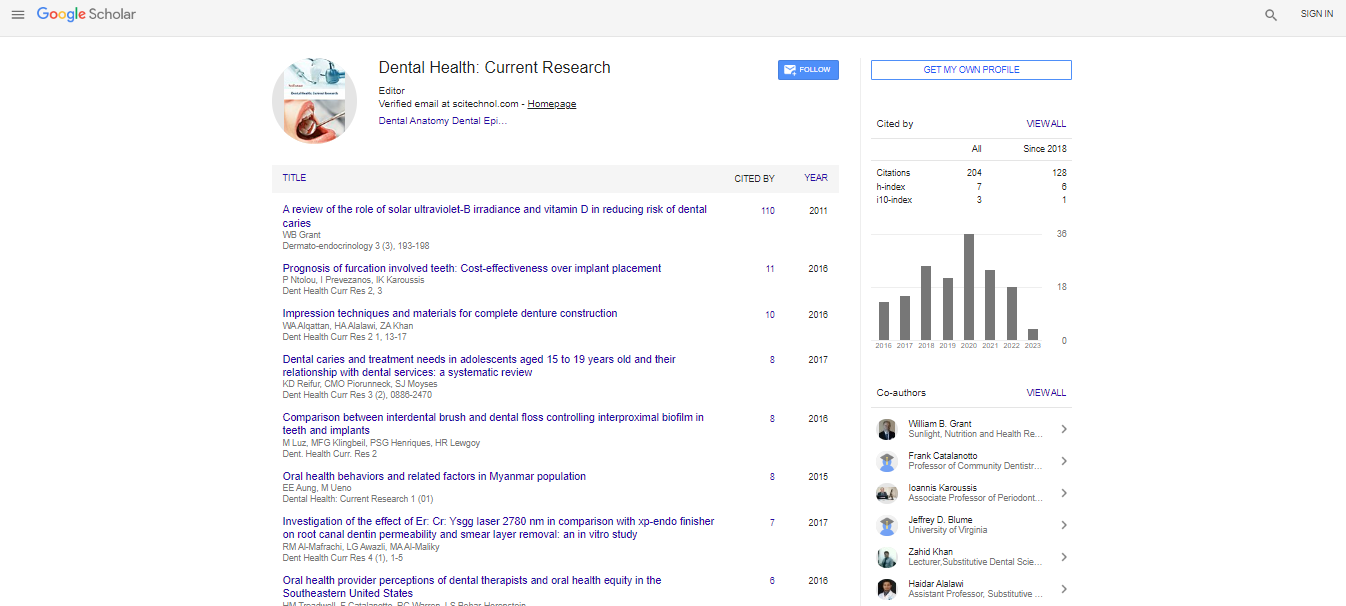Commentary, Dent Health Curr Res Vol: 7 Issue: 9
Geriatric Dentistry and the Common Dental Issues of the Elderly
Jiiang Huei*
School of Dentistry, National Taiwan University, Taiwan
- *Corresponding Author:
- Jiiang Huei
School of Dentistry, National Taiwan University, Taiwan
E-mail: jiangh3490@gmail.com
Received Date: September 07, 2021; Accepted Date: September 21, 2021; Published Date: September 28, 2021
Citation: Huei J (2021) Geriatric Dentistry and the Common Dental Issues of the Elderly. Dent Health Curr Res 7:9. 163.
Copyright: © All articles published in Dental Health: Current Research are the property of SciTechnol, and is protected by copyright laws. “Copyright © 2021, SciTechnol, All Rights Reserved.
Keywords: Geriatric Dentistry
Geriatric Dentistry
Geriatric dentistry is a science which deals with the diagnosis, management, and prevention of all kinds of oral diseases within the elderly population. It centers on delivery of dental care to the older populace and addresses age-related dental ailments. The dental illnesses that the elderly are particularly helpless to are root caries, attrition, periodontitis, lost teeth due to earlier neglect, edentulism, destitute quality of alveolar edges, ill-fitting dentures, mucosal lesions, oral ulceration, dry mouth (xerostomia), oral cancers, and wild caries. Many of these are the sequelae of neglect within the early a long time of life, for instance, consumption of a cariogenic diet, need of awareness regarding preventive aspects, and habits like smoking and/or tobacco, pan, and areca nut chewing. Of these problems may increase in magnitude due to the declining immunity in old age and since of coexisting medical problems. As a result of poor systemic health, the elderly patient often doesn’t pay sufficient attention to oral health. Additionally, medications like anti-hypertensives, antipsychotics, anxiolytics, etc., lead to xerostomia, and therefore the absence of the protective influences of saliva within the oral cavity increases the predisposition to oral disease. Financial constraints and lack of family support or of transportation facilities influence get to to dental services in afterward life. The untreated oral cavity has its harmful impacts on comfort, aesthetics, speech, mastication and, subsequently, on quality of life in old age. The main issue that the dentist faces when treating the elderly patient is that the complexity of treatment gets compounded with ageing. The oral cavity is a crucial a part of the body, with a crucial role in chewing, swallowing, speech, facial expressions, and in maintaining the nutritional status and systemic health, also as self-esteem. Factors like mental illness, dementia, psychosis, neurosis, depression, parkinson’s disease, arthritis, stroke, and muscular weakness, all common within the elderly, affect locomotor abilities and consequently the capacity to seek treatment. Moreover to this, the dentist’s behaviour and attitude toward the patient and so the time that the dentist allocates for elderly patient is significant in the event that effective treatment is to be provided. The fear and anxiety felt by an elderly quiet should be dealt with compassion. Such patients need more of the dentist’s time but, regularly, cannot manage to pay large sums; earning more cash being a significant objective, the active dental practitioner has little time to save for the elderly patient, who is rapidly disposed of in clinics. Most dental specialists accept that they’re prepared with all the information and abilities required to treat the dental issues of the elderly, but this can be often not always so. A parallel can be drawn with pediatric dentistry. At one time, the same thinking prevailed regarding pediatric dentistry but, today, it’s a serious clinical specialty in dentistry. Similar was the case for the specialty of paediatrics when it first started in our country; a couple of medical colleges even had to name the pediatric department as the ‘well-baby clinic’ to run it as a separate specialized branch, as the medical practitioners of the day considered themselves capable of handling the medical problems of the pediatric population without any formal training. At present, we’ve super specialties within paediatrics itself, such as neonatology, pediatric neurology, and pediatric gastroenterology.
Another factor worth emphasizing is that not many of us want to work in this field due to lack of knowledge regarding the psychological management of these patients; the exception being those that are naturally interested in the welfare of the elderly. Provision of oral health care requires an insight into and ability of the many aspects that have now evolved within the treatment of elderly dental patients. Training in ‘geriatric dentistry’ would enable provision of affordable, quality oral health care, with appropriate attention to the special needs of an ageing population. Coordination of services for the elderly through a multidisciplinary team, including colleagues from geriatric medicine, is important and would contribute to meeting the dental care workload proficiently.
In the West, geriatric dentistry is a subject that’s spread over the dental undergraduate curriculum and pertains to each aspect of provision of oral health care to the elderly. It’s a specialty that takes care of oral health needs of the young old (65-74 years); old old (75- 84 years), and the oldest old (85+ years). Careful consideration of all coexisting medical problems before initiating treatment is a cardinal rule in geriatric care.
 Spanish
Spanish  Chinese
Chinese  Russian
Russian  German
German  French
French  Japanese
Japanese  Portuguese
Portuguese  Hindi
Hindi 